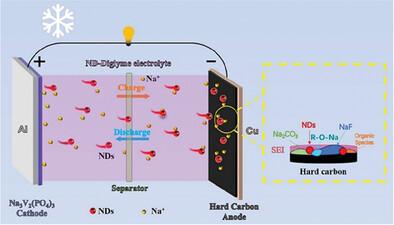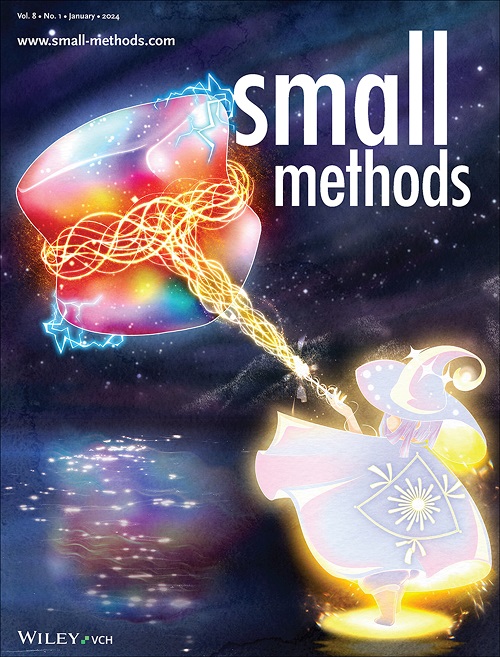Nanodiamond‐Assisted High‐Performance Sodium‐Ion Batteries with Weakly Solvated Ether Electrolyte at −40 °C
IF 10.7
2区 材料科学
Q1 CHEMISTRY, PHYSICAL
引用次数: 0
Abstract
Realizing high performances of sodium‐ion batteries (SIBs) working at low temperatures is a pressing need for the commercial applications of SIBs. In this work, nanodiamonds (NDs) are introduced in diglyme electrolytes (ND‐Diglyme) to significantly improve the low‐temperature performances of SIBs. The corresponding SIB achieves an initial reversible specific capacity of 324 mA h g

纳米金刚石辅助的-40 °C弱溶醚电解质高性能钠离子电池
实现钠离子电池在低温下的高性能是钠离子电池商业应用的迫切需要。本研究在二甘醇电解质(ND-Diglyme)中引入了纳米金刚石(NDs),以显著提高钠离子电池的低温性能。相应的 SIB 在 -40 °C 时的初始可逆比容量为 324 mA h g-1(与 25 °C 时的 357 mA h g-1 相比略有下降),在 0.1 A g-1 的条件下循环 100 次后,容量保持率≈82%。此外,在 1 A g-1 条件下,它的容量高达 40 mA h g-1,几乎是纯 Diglyme 电解质的五倍。实验表明,引入 ND 有助于抑制树枝状突起的生长和提高阳极在低温下的循环稳定性,因为对钠离子具有强吸附性的 ND 不仅能帮助形成富含 NaF 和 Na2CO3 的有效固态电解质界面,还能有效降低电荷转移过程中的活化能(从 426.68 meV 降至 370.51 meV)。因此,本研究提出的 ND 辅助弱醚电解质是一种可行的电解质添加剂解决方案,可满足 SIB 日益增长的低温需求。
本文章由计算机程序翻译,如有差异,请以英文原文为准。
求助全文
约1分钟内获得全文
求助全文
来源期刊

Small Methods
Materials Science-General Materials Science
CiteScore
17.40
自引率
1.60%
发文量
347
期刊介绍:
Small Methods is a multidisciplinary journal that publishes groundbreaking research on methods relevant to nano- and microscale research. It welcomes contributions from the fields of materials science, biomedical science, chemistry, and physics, showcasing the latest advancements in experimental techniques.
With a notable 2022 Impact Factor of 12.4 (Journal Citation Reports, Clarivate Analytics, 2023), Small Methods is recognized for its significant impact on the scientific community.
The online ISSN for Small Methods is 2366-9608.
 求助内容:
求助内容: 应助结果提醒方式:
应助结果提醒方式:


